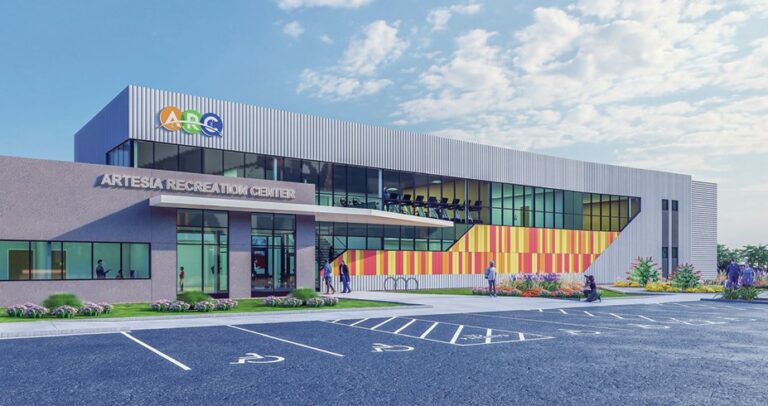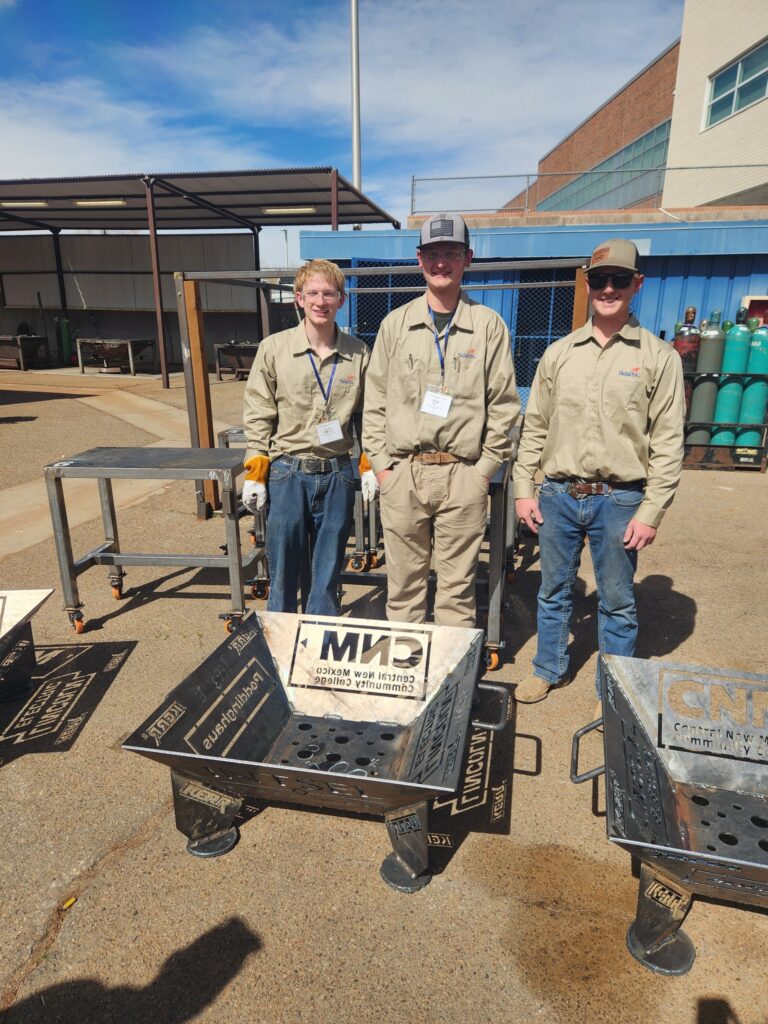Artesia group sues to overturn state’s EV mandate

Adrian Hedden
El Rito Media
achedden@currentargus.com
An Artesia-based nonprofit is suing the state of New Mexico over electric vehicle requirements imposed last year on newly-built businesses and homes statewide – rules the group said were unfairly delaying construction and driving up the cost of a recreation center in the northern Eddy County city.
Artesia is situated in rural southeast New Mexico, known for its oil and gas fields and ranching. Motorists often drive long distances to access services such as medical care, meaning to local leaders that electric vehicles are incompatible with the area’s way of life.
That’s why locals argued that the new regulations’ requirement of 36 electric vehicle spots at the Artesia Recreation Center, which is under construction next to the city’s Aquatic Center, were unnecessary and unduly “burdensome” to the $35 million-plus project.
The land for the center is privately owned, and the center is being built by the nonprofit Artesia Recreation Center Foundation using private donations. When complete, the facility and land will be “gifted” to the city of Artesia, according to a Foundation news release.
The dispute over electric vehicle parking places has slowed construction of the center, originally set for completion in March of next year but now expected to be delayed until May 2026. The rules are also expected to add hundreds of thousands of dollars to the cost of the project, according to the Artesia Recreation Center Foundation
As a result, the Foundation filed suit on Tuesday, Jan. 14, in Fifth Judicial District Court against the Construction Industries Division (CID), the state agency responsible for adopting and enforcing the disputed requirements. The Foundation is being represented by Albuquerque-based attorney Peter V. Domenici, and a court hearing was not scheduled as of Wednesday.
The CID is a division of the New Mexico Regulation and Licensing Department (NMRLD), a cabinet agency within the state’s administration tasked with regulating building codes and permitting. The head of the department is Superintendent Clay Bailey, who was appointed by Gov. Michelle Lujan Grisham.
The updated building code was approved in January 2024 by the Division and took effect July 30 of that year.
“This regulation has placed an unexpected financial burden on our project, potentially jeopardizing key amenities that our community overwhelmingly supports,” said Sandra Borges, president of the Artesia Recreation Center. “We’re committed to standing up for Artesia and ensuring that this project fulfills its promise to our residents.”
The 49,120 square-foot center is designed to include indoor and outdoor basketball courts, pickleball courts, a walking track, cardio and weight equipment, an indoor playground, fitness classrooms and a multi-purpose room. A budget of $35.5 million in total was assessed for the project, including construction, land costs and equipment.
The Foundation, which served as plaintiff in the lawsuit, is a registered 501(c)3 formed in 2023 to raise money to pay for the setup and design costs of the project.
Donors for the rec center project are: PY Foundation, Chase Foundation, TLC Foundation, Frank Yates Jr. Family Foundation, Western Bank, Royal Services, First American Bank and Devon Energy.
Spokesperson for the Regulation and Licensing Department Andrea Brown said the agency does not comment on pending litigation. She said on Wednesday the Department was not yet officially served with the lawsuit.
Lujan Grisham’s office did not respond to a request for comment as of press time.
“As always, the Construction Industries Division remains committed to serving the public and its licensees and is always available to promptly answer any questions we can about building codes, administrative rule requirements, or statutory requirements that might affect new construction projects,” Brown said in a statement.
Rules add thousands in cost
The suit called for the rules to be deemed “illegal and unenforceable” and for a court to award the foundation damages to be determined at trial.
Scott Taylor, owner of Permian Construction, who served in an advisory capacity between the Foundation and the project’s architect Huitt-Zollars of El Paso, estimated in September that the rules would add $800,000 to the cost of construction. He also said the rules were overly vague and difficult to interpret to ensure the project complied.
Taylor said an $800,000 “holding cost” was added to the project’s budget, as several aspects of the new rules were reviewed. The lawsuit filed Tuesday in Fifth Judicial District Court estimated a potential increase between $300,00 and $700,000 in the cost of the project.
Taylor serves on the Artesia Chamber of Commerce Board and led the city’s MainStreet Board. He and his company were also involved in additions to the Eddy County Fairgrounds last year.
The cost of a $2 million project built by Taylor last fall, Eyesite’s new location on 26th Street, increased by $30,000 because of the regulations, Taylor said. That project was completed, but Taylor said the impacts to the recreation center were too much for the Artesia community – and others across the state – to bear.
“This regulation lacks consideration for local needs and practical realities,” Taylor said. “The decision to challenge this mandate isn’t just about Artesia—it’s about protecting all New Mexico communities from costly and impractical requirements that hinder development.”
The rules stipulated that commercial buildings have EV chargers in 1-5% of available parking spaces, based on the kind of business. New homes must also be equipped with electrical outlets adequate to support EV charging.
Residential buildings were required to have a 50-amp circuit breaker installed and connected to an electrical outlet with a 6-gauge wire capable of charging an EV.
For the rec center it means that of the 234 planned parking spots, 12 would need to be electric vehicle ready, while another 24 would need to be capable of having chargers installed in the future, Borges said.
Of the 11 handicap parking spots included in the plans, Borges said, two would be for electric vehicles.
Rules violate civil rights, lawsuit reads
In its lawsuit, the Foundation said the rules initially led to a denial of its construction permit to build the recreation center.
The group first applied to the Construction Industries Division for an early work permit on Oct. 28, 2024, to break ground on the rec center and the permit was issued 10 days later, on Nov. 7, 2024.
Work began to break ground, and on Nov. 22 the foundation applied for a construction permit to build the center. The Division denied the construction permit Dec. 3, 2024, the suit read, citing violations of the EV requirements.
The Foundation admitted that its plans as of November did not include any electric vehicle infrastructure for the recreation center, such as EV chargers on parking spaces, supply equipment or spaces capable of having chargers installed.
The Foundation submitted a second set of plans to the Division on Dec. 12, 2024, read the suit, along with a second application for a construction permit. The lawsuit said the Foundation was unable to interpret from the new codes exactly what needed to be added, and instead relied on its engineer’s “own knowledge and expertise” with electric vehicles and related infrastructure. The engineer is QA Engineering of Albuquerque, a firm subcontracted by Huitt-Zollars.
Taylor said the Foundation’s construction permit was issued on Tuesday, the same day the group filed its lawsuit. He said he thought the timing was coincidental. The permit, Taylor said, used language from the codes to allow a single conduit installed on a parking lot median that could then be connected to the spots when needed, adding just $350,000 to the overall costs.
Another section in the codes requires a conduit for each of 24 EV-ready spots, and Taylor worried the Division in the future could require the center to follow this language, adding another $400,000 to the project, he said.
Either way, the added cost should be picked up by the Construction Industries Division, argued the lawsuit, as the agency that mandated the EV spots.
The rules also violated the New Mexico Civil Rights Act of 2021, the suit read, which protects the public from suffering at the hands of public bodies the “deprivation of rights, privileges or immunities secured under the bill of rights of the Constitution of New Mexico.”
The Foundation argued it was due damages paid by the state in an amount to be determined at trial for civil rights violations and a “taking” of private property brought on by the mandate without “just compensation.”
The lawsuit also alleged that the Division did not have the authority in state statute to impose the electric vehicle mandate.
That argument centered around the Construction Industries Licensing Act, last amended by the New Mexico Legislature in 2019 and renamed the Construction Inspection and Licensing Act.
According to the law, the Division was tasked “to promote the general welfare of the people of New Mexico by providing for the protection of life and property by adopting and enforcing codes and standards for construction excavation, alteration, installation, connection, demolition and repair work.”
Another clause stipulates the Division is responsible for adopting “all statewide building codes and minimum standards as recommended by the trade bureaus to the director and approved by the commission.”
But the new codes, read the suit, do not support public welfare, instead adding a “severe and expensive” delay to the rec center project which the Foundation argued would provide “health, wellness, community outreach and educational programs” for Artesia residents.
‘Ramming it down our throats’
Newly elected State Sen. Jim Townsend (R-34) of Artesia said he and other lawmakers in the southeast region opposed the rules from the start. Townsend pointed to Senate Bill 77, which contained the same electric vehicle rules enacted last year but was rejected by lawmakers during the 2023 Legislative Session.
An analysis by the Legislative Finance Committee on SB 77 published during the 2023 session found the rules would cost on average an extra $5,000 per home.
City councils in both Carlsbad and Artesia passed resolutions last year opposing the rules.
Townsend said the lawsuit was an important effort to “stand up” to the administration’s “disingenuous process” of putting the rules in place and circumventing the Legislature.
“The impact of the rule to the economy in New Mexico is enormous,” Townsend said. “I believe the governor or somebody on her staff said to the (Division) ‘We didn’t get our rules so let’s ram it down everybody’s throat.’”
Aside from the Artesia Recreation Center, Townsend said the rules could impede development across the state, especially in small but rapidly growing towns in the southeast region, amid the booming Permian Basin oilfields.
“I’m grateful that someone developed a spine to stand up to the governor, but it’s not just one project. It’s not only going to affect Artesia, but everyone in the state.”
And electric vehicles, while convenient in bigger cities where commutes are shorter, Townsend said, are not widely used or practical in rural areas, meaning adding charging capacity to businesses and homes was unlikely to prove a local benefit.
“If you want one, you should be able to buy one. But I’m not going to stand by and let the governor tell me what to drive,” he said. “What about the older person in Jal who has to go to Lubbock (Texas) for the doctor and have to go there and back in the same day? You can’t do it in one of these (EVs).
“It’s not right.”



